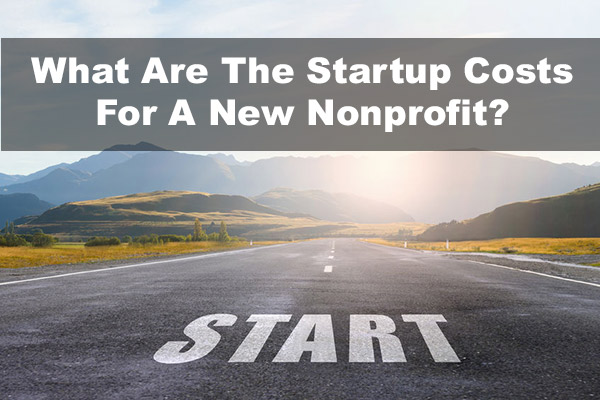You have a wonderful cause that is helping your community and you want to become an official nonprofit charity. So your question is likely, “What are the typical startup costs for a nonprofit?” The answer is, “It depends!”
It depends on where you are, how big you think your budget will be, and where you think you will be working, along with some other factors.
Here are some basic costs that you will definitely have, to get you started on your brainstorming and planning.

1. Cost for Incorporating Your Nonprofit
You need to be an incorporated business to file for charitable status. Every state has different rules for how to incorporate. You need to check the current laws in your state, and possibly even in your local county or municipality.
Nonprofit Hub has a state by state list of costs, found here. You can google “how to incorporate a nonprofit” in your state particularly to find the agency and the forms you need. Usually you register with the department of state in your gubernatorial system.
Every state is different, and some require extra fees to create a name on their registry or to expedite the process. Idaho only charges $30, but California might cost you hundreds. And many states require paying a fee for local registry in their Bureau of Charitable Organization or businesses. This certificate is required to fundraise if that is the case. You will likely need to reapply on an annual basis as well (paying annual fees).
Legal Zoom advises that you hire an attorney to put your paperwork together and to help you with the process, though it is not a requirement. An attorney will likely cost at least $500.
In all, you should consider that incorporating might cost between $100 and $1,000.
Also read: Should Your PTO File For Nonprofit Status?
2. Cost to apply for Nonprofit Tax Exemption from the IRS
You need to file for tax exemption from the government. The IRS has a handy interactive webpage on the topic found here. This is one of the most significant startup costs for your new nonprofit.
First, though there is no cost associated, you have to fill out the government form to receive an Employee Identification Number. Make sure you remember to include this step in your planning! You apply for the number after you incorporate but before you file for tax exemption.
If you plan to raise less than $50,000, and you are a church, school, or charitable organization, you can likely file the 1023 EZ. This form can be filled out with online software aids and will take less than 20 hours in total to complete. In 2018, the fee was $275.
The more complicated form, the 1023, takes at least 100 hours and costs a flat fee of $600. Make sure you check on the IRS site though, because they change the fee amounts regularly. In 2017, some organizations had to pay $850.
3. Factor the Hidden Startup Costs to Nonprofit Registration
When you are planning for your nonprofit registration, make sure you think about all of the additional startup costs involved that are not direct fees.
- Report filing. You need to file a 990 to keep your nonprofit status. This takes time, energy, and accounting skills. If you are going to do it yourself, you need to make sure you are regularly tracking your costs and fundraising inputs. Glassdoor estimates a nonprofit bookkeeper earns $11 to $12 an hour or $39,000 to $42,000 annually.
- Auditor. If you are making more than $250,000 annually, you likely will want to pay for an independent auditor on top of an internal bookkeeper. They can cost $10,000 even for a small nonprofit, and much more for larger organizations.
- Contract support writer. If you need help putting together the text for your application, you might need a freelancer that specializes in IRS technical writing. Often grant writers have these types of skills as well. Try Upwork or a similar platform, and expect to pay at least a few hundred dollars.
- Fundraising management. It is wonderful to be a 501c3. Now who in your organization is going to manage your donors and your grant reporting? You need to think about this cost in real terms. If you plan to do it yourself, factor at least 20 hours a month for fundraising.
- Telecom and operating expenses. You need to have regular meetings with a board of directors and jumpstart your organization, including website fees and other costs.
In all, you can expect, even if you expect to be the smallest of charities, to have fees of at least $350 to incorporate your organization and to register with the IRS. Likely, if you seek just modest legal and administrative support, the startup costs will be between $1,000 and $1,500. Assume to spend between 40 and 150 hours altogether depending on your scope.
You might also consider contracting a fiscal sponsor – a go through organization to manage your charitable status and help with grant and fundraising administration.
And think very hard about whether or not you really want to start a nonprofit before you go through the establishment process! Here are 5 questions to ask yourself before you start registering and paying fees.
